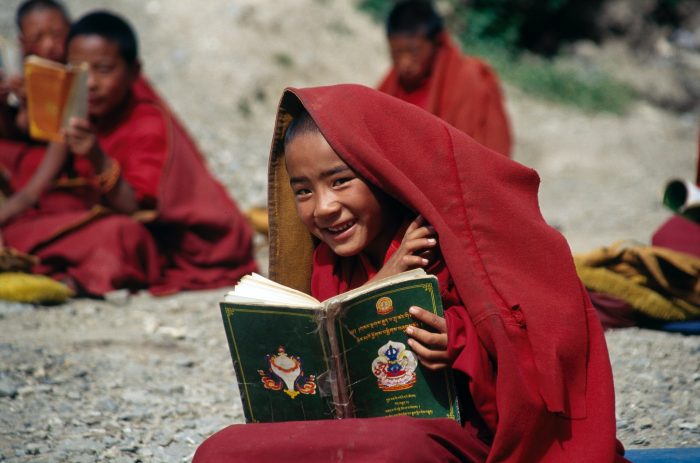Chogyam Trungpa, a famous Buddhist teacher, wished people a “Cheerful Birthday.” He didn’t like the word, “Happy.”
“Happiness,” he’d say, is a temporary, conditional state of mind. It’s part of ego’s play—samsara—the cyclical search for pleasure that is itself the cause of most unnecessary suffering in this world. Rather, let’s aspire to “cheerfulness”—in the sense of an unconditional confidence and relaxation and appreciation and sense of humor, regardless of the circumstances.”
Children are far from perfect. They’re children. But they have some very real—and accessible—wisdom that they are born with, and that most of us lose, mostly, along the way.
Anyway, with that prenup, let’s engage in the Ancient Art of Top 10 Lists:
10 Ways Children can point us toward Enlightenment.
1. Say what you think. Be frank, be honest. Is that woman fat? When you’re a child, you’ll say so—outloud, to the consternation of your parents. Is that toy yours? Are you unhappy? Say so. Be who you are. Don’t smile fakely, don’t say “great wonderful lalalalalala” in Facebook comments if you didn’t think something was great wonderful lalalalala.
2. Sleep. Sleep more. Sleep plenty. I haven’t slept enough for 15 years, probably. Arianna Huffington, to her credit, has been on the warpath about this. New York Times agrees: sleeping makes us smarter, more present, better at our jobs and relationships.
3. Cry. Then, forget what you were crying about. If you’re unhappy, go there. Like #1, don’t reject feelings because they aren’t “approved.” Be negative. Regret mistakes. Wallow in heartbreak—briefly. Then, move on.
4. Work hard at Playing. If your work isn’t fulfilling you, get a new job. Seriously. That’s not advice for yuppies—that’s advice for living. If you’re a writer, get a job watching a parking lot or hotel, where you can read. If you enjoy manual labor (my house painter friend loves to paint—especially when the paint is “eco” and non-fumey—he loves the exercise, the money, and being out-of-doors), god bless: no type of workplay is any better than any other (you’ll discover that, parents, when you buy your child a pricey, silly present only to find them playing with a cardboard box, an hour later). In Buddhism, we call it “natural hierarchy—do whatever you 1) love that you’re 2) best at and 3) is of most service to the welfare of others. You do those three things, and work becomes joy…you know, playtime.
5. Get in water once a day. Swim. Bathe. Children swim. A lot. They love water. Old wrinkly cranky uptight stressed cool people don’t jump in water enough. I should know. I’ve been both.
6. Laugh. Children are good at laughing. I’m really popular with children—mainly ’cause I got this whole wink/jump around/laugh/run around/make funny noises/make weird faces moves. They go crazy for that stuff. Last time I laughed? Yesterday, probably. I can’t remember. I smile a lot. I make jokes and all that. I listen to jokes and all that. I remember almost laughing today. I probably laughed a bunch, but forgot. Anyways…that’s my point: we get old when we can’t remember the last time we laughed. Americans spend millions and billions on bodywork and moisturizer and exercise and plastic surgery and hair tinting…when laughter, free, will make you look ravishing and happy and keep you healthy. Get on it.
7. Get lost in the details of every present moment. Just be. Look. Listen. Everything is new.
8. Argue. Someone being mean? Tell them so. Being mean? Let it all out. Either way, get through it, don’t suppress your sadness or anger, and if you make a mistake, be ready to learn from those who are wiser (ie, teacher or parent who might take you to task for being a jerky-pooh).
9. Jump up and down. Run. Nap. Emote. Play. Holler. Be a fool. Smile. Laugh at yourself.
10. Out of ideas? Stuck? Ask for help. Be vulnerable. Don’t worry about things. Can’t think of, say, 10 ideas for your blog? Who cares. It’s just a silly list. Ask your friends for four more ideas, and ask them to write said ideas—things children do that are welcome and inspiring reminders for all of us—children rely on parents and adults for a lot of things. It’s called community. So give me four more ideas. Or three, if you want to count this one (community).
 Share on bsky
Share on bsky





Read 47 comments and reply